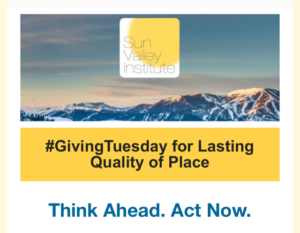|
Dear Community,
As the Sun Valley Institute moves into its fourth year, we’re reflecting on what we’ve accomplished and what we’ve learned, and are looking forward to what we can do better and take to greater scale. With the support of our community, we’ve made an impactful start and now are poised to expand and accelerate our contribution to resilient prosperity in the Blaine County region and beyond. We’d like to share with you a review of what we’ve done, some thoughts on where we’re headed, and, if this excites you, ask for yourcontinued support.
As you know, SVI was founded to advance economic, ecological and social resilience in Blaine County with models and programs that are scalable and replicable nationally. As we read reports of staggering wildfire impacts throughout the west, water shortages and food supply issues around the world, as well as increasing social division, we are reminded that the urgency of creating real, lasting community resilience has never been greater.
Our focus now is to sharpen our impact, turn risk into opportunity, and help Blaine County and the global community prepare for these changes in a way that provides lasting, stable prosperity for everyone, regardless of economic standing, nationality, age, and gender. This is at once a monumental challenge, an exciting possibility, and an urgent need – here, across our state, and far beyond.
SVI will respond by strengthening our support of our programs in four powerful areas:
- Shift to resilient, cleaner, locally-generated and renewable energy supplies coupled with increased energy efficiency and storage technologies to provide greater security, cost-savings, job creation, and environmental benefits;
- Shift to increased reliance on locally and regionally produced food, supporting our rural neighbors and economy, and decreasing dependence upon the unstable and ecologically damaging industrial food system;
- Develop plans, policies and projects based on systems thinking and scenario planning; and
- Convene those invested in building solutions to accelerate impact, such as through the Blaine County Resilience Workshops (first one on December 3rd) and our 5th annual global Sun Valley Forum, July 23-26, 2019, with top thinkers, doers and leaders.
2018 highlights and 2019 plans:
Energy: SVI partnered with the U.S. Department of Energy Idaho National Laboratory, local cities and the county to develop a digital blueprint of Blaine County’s electricity system, one of just three communities nationwide. We identified the power needs of our critical response infrastructure (fire, police, water, medical, communications, etc.), and potential projects to ensure ongoing operations during service interruptions. Next up for 2019, we intend to build plans and secure the capital (grant, government and private investment) to meet our critical loads and create local jobs for positive economic and environmental impact.
Food: Local food is a powerful lever to benefit health, economic prosperity and our environment. SVI’s food program, the Local Food Alliance (LFA), in partnership with University of Idaho and Blaine County Food Council, has engaged a nationally renowned food system analyst and economist, Ken Meter, to create a Community Food System Strategic Plan. Ken’s decades of experience will help us to prioritize food system infrastructure work and projects, such as food storage and distribution. This is a pivotal time: in 2019, we are excited to act on the recommendations.
Land Use: Blaine County has significant open space and land resources that can provide much-needed affordable food and housing and ample recreation and wild spaces. To help optimize our land use for immediate and long-term benefits, the Institute consults to landowners and developers to deploy innovative land-use strategies and new business models and to access capital and investment partners.
Community Planning: Since its inception, the Institute frequently has been approached to consult with local leaders on opportunities and risks. Leveraging SVI’s knowledge and experience, we have connected these leaders with best practices for policies, strategy, investment and technology resources and innovative business models. In 2018 and 2019, in partnership with Blaine County and other organizations, the Institute is leading our community in a formal process to identify and address Blaine County’s top threats and to transform risks into opportunities. We are interviewing dozens of community members and convening workshops to identify our current gaps, consider future trends, and prioritize specific projects (e.g., greenhouses, cold food storage, optic fiber for telecommunications) via the lens of climate change. The Institute will ensure each project has implementation plans to bring them to fruition.
Sun Valley Forum: In Summer 2019 we will host our 5th annual Sun Valley Forum where we catalyze connections, conversations and capital for a more secure, prosperous and healthy world. We gather leaders and innovators to share expertise, accelerate efforts and unearth opportunities for new collaborations and solutions. Speakers come from diverse perspectives and experience, from U.S. Senator Cory A. Booker to visionary Paul Hawken, from Paul Allen’s Vulcan Productions to adventurer-athlete-advocates including Arctic explorer and philanthropist Sir Robert Swan. We include companies like Hewlett Packard, Microsoft and Domo, and investors like BNP Paribas/Bank of the West, Generation Investment Management and Turner Impact Capital. We’ve watched the magic of the Forum lead to new partnerships and accelerated, scaled impact, and look forward to hosting our Forum 2019 at the new Ketchum Argyros Performing Arts Center, July 23-26, 2019. |








